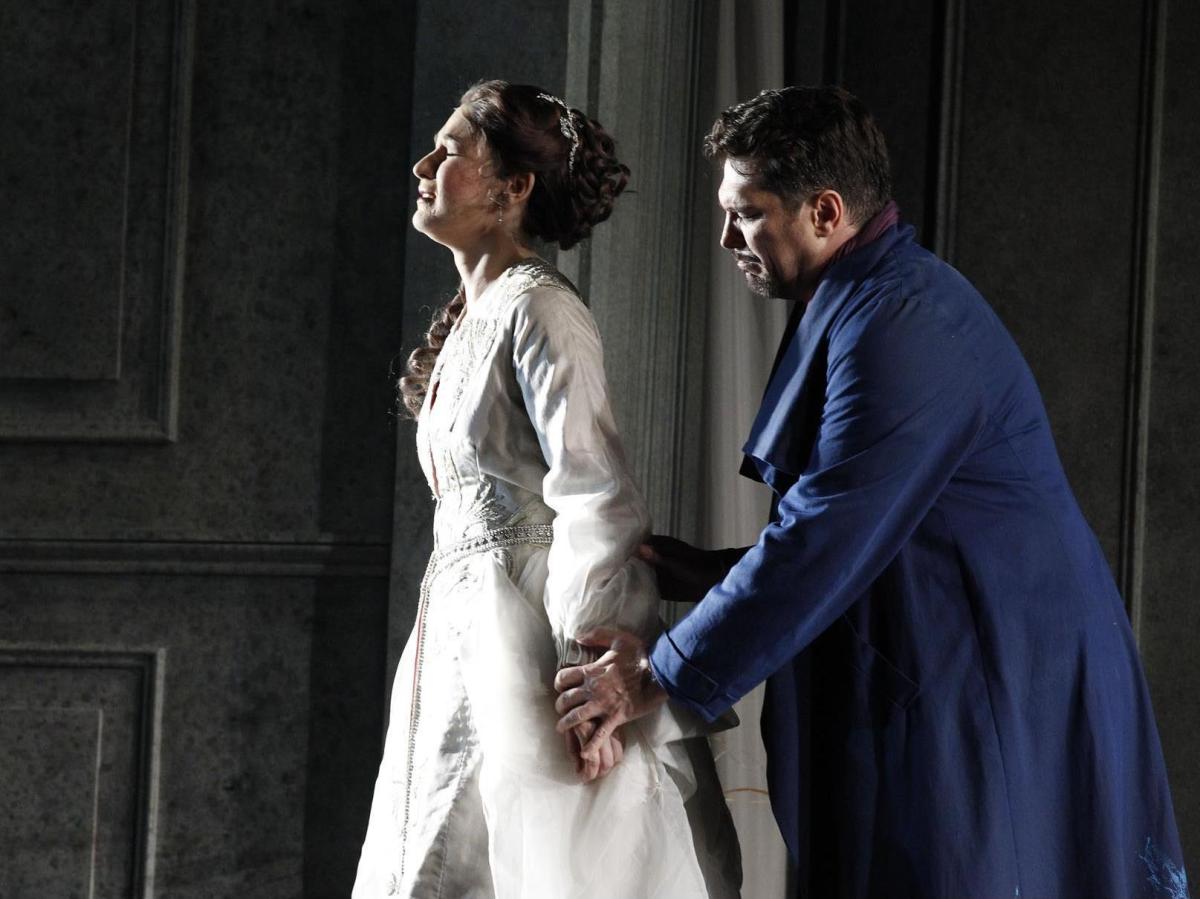Nicole Carr as Tatyana and Paulo Szot as Onegin. Image by Jeff Busby.
Too rarely performed in Australia, Tchaikovsky’s experimental, autobiographic masterpiece is given a provocative production by one of the world’s leading directors.
When Tchaikovsky began work on Eugene Onegin, he confessed that Pushkin’s poem ‘does not give scope to full operatic treatment’. The text was episodic, rather than evolving, and ended with suppressed passion and a miserable future for the two principals rather than grandiose, fatal deaths all round.
Tchaikovsky was also recovering from his short-lived and disastrous marriage and the subject mirrored his own state of mind at the time. As the composer’s homosexuality became more widely known after his death, critical reaction to his music suffered a reversal and he was often dismissed as neurotic, unable to keep his musical thoughts straight – let alone his non-musical ones. Eugene Onegin was thought to be more diaristic than operatic: the heroine Tatyana’s recovery from an honest but unwise declaration of true feelings and her more circumspect but empty life thereafter closely resembled the composer’s.
The work’s deeply felt sense of endless melancholy – rather than boom and bust passion – may have been confusing, but the same themes that pervaded Chekhov’s plays in the following decade gave it the same striking modern sensibility.
After 13 years as artistic director of Denmark’s Royal Opera, Kasper Holten became the artistic director of London’s Royal Opera in 2013 with this Eugene Onegin as his debut production. He, too, wanted to examine the melancholy at the work’s core, and, perhaps like Tchaikovsky, might have encouraged the audience to find ‘immediate emotional identification’ rather than just observe.
Holten keeps the early nineteen-century aesthetic for the production’s costumes and a single set serves for all the six scenes, although detritus from each (including Lensky’s dead body) remains on stage as reminders of the emotional wreckage that takes place along the way.
Holten wanted the characters to dialogue with their younger selves, and, in playing out key solos, uses two dancers to represent the younger Tatyana and Onegin. Other characters address the dancer while the singer watches and performs the music, often giving the impression of recalling a painful past event. This works for the most part, even assisting moments like the famous ‘letter scene’ where the dancer acts the letter writing and soprano, Nicole Carr, can sing the aria in near stillness, and bring to the sense that it is an internal monologue.
Carr has everything the role needs: youthful looks, voice and a wide range of colours which she displays especially in that scene which, after singing about mentioning things, ‘too frightening to read’ and ‘swooning in shame and fear’, she climaxes in a tone of near eroticism. No wonder we read Tchaikovsky’s own predicament into it!
Holten sees Onegin as a sympathetic character rather than cynical and callow so his gentle rejection of Tatyana is made even more agonising. He even gives her a gentle kiss, and, rather than walk away, he gazes at her!
Paulo Szot is as good-looking an Onegin as Carr is as Tatyana, and smoothed voiced to go with the smoother character. He rises to the challenge of the last scene, gives an extroverted account of his ‘letter scene’ and Carr matches him in the final duet.
James Egglestone does not quite achieve the same feeling of delivering an internal monologue in his solos (but what singers can create the sense of intimacy that the work requires?) Sian Pendry creates a wonderful impression as Olga. Her extroverted singing in scene 4, when she dances with Onegin, shows the young girl enjoying brief escape form social restraints. When she realises its consequences, her misery is superbly conveyed.
In reproducing Holten’s original direction, Roger Press has seen that minor characters are played with a Chekhovian detail. Daniel Sumegi is a glorious Prince Gremin, who in this production observes Tatyana’s final encounter with Onegin and suggests more misery is in store. Dominca Matthews is a superbly nuanced Madam Larina, Jacqueline Dark a wistful nurse Kanen Breen as a droll, foppish Triquet.
The chorus are terrific and Eugene Onegin has dances on the same level as Swan Lake – but they are kept under control; the ones in the last act even performed ‘off stage’ so as to maintain the intensity of the final drama. The music could easily be assembled into several Tchaikovsky symphonies and Guillaume Tournaire brings out the swing, dance and angst of drama in equal terms. It may be near impossible to really make this work as an intimate drama, but, to hear it open up at full throttle as it does here, is hair-raising.
Rating: 4 out of 5 stars
Eugene Onegin
Opera Australia
Conductor: Guillaume Tournaire
Director: Kaspar Holten (rehearsal director: Roger Press)
Set Designer: Mia Stensgaard
Costume Designer: Katrina Lindsay
Lighting Designer: Wolfgang Goebbel
Cast includes: Nicole Carr, Paulo Szot, James Egglestone, Dominica Matthews, Daniel Sumegi, Jacqueline Dark, Kanen Breen and dancers Emily Ranford and Sam Colby as the young Tatyana and Onegin
State Theatre, Arts Centre Melbourne
www.opera.org.au
Until 9 May





